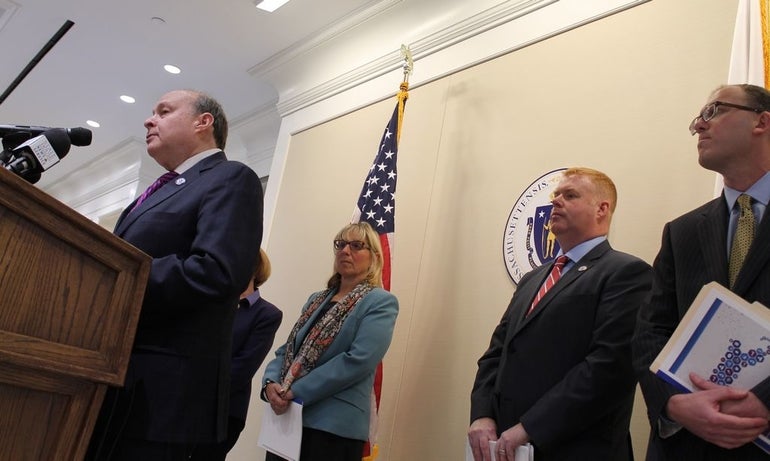New oversight for pharmaceutical companies, the creation of a MassHealth “buy-in” program and a target for hospital reimbursement rates are among the reforms and cost-control efforts contained in a wide-ranging bill a group of Senate Democrats rolled out Tuesday.
Senators who discussed some provisions in the bill in a press conference Tuesday estimated it could eventually save hundreds of millions of dollars and said they hoped the bill could serve as a national model, pointing back to the 2006 state health care access law that mandated insurance coverage.
Lawmakers this summer rejected MassHealth reforms Gov. Charlie Baker said were necessary to put the state’s Medicaid program on a more sustainable path as enrollment continues to grow and workers choose MassHealth over costlier employer-sponsored coverage.
The Senate bill, which is scheduled for a public hearing Monday, is not as specifically targeted as Baker’s proposal. It includes some measures intended to draw savings out of MassHealth while also offering up reforms for the broader health care system.
The bill permits MassHealth to offer what the senators described as an “optional expanded Medicaid buy-in plan for employers.”
Sen. James Welch, who led the group that developed the bill and a related report, said this would provide a new option for employers whose workers qualify for MassHealth coverage, allowing them to coordinate with MassHealth to offer “a MassHealth-type plan” with the cost borne by the employer.
The bill picks up a Baker proposal to require employers to report information on their health insurance offerings, which the senators said would allow MassHealth to improve the targeting of its premium assistance.
It would also enroll MassHealth-eligible consumers participating in the home care program into the Senior Care Options program, with some exceptions, shifting those who do not opt out from an entirely state-funded program to a federally matched one.
The senators eschewed Baker’s recommendation to move 40,000 childless adults and 100,000 parents and caretakers off of MassHealth and into subsidized ConnectorCare plans. Referencing the unsettled nature of the federal health care debate, Senate Ways and Means Chair Karen Spilka said they were concerned about “what might happen to them and their premiums and their coverage.”
Any proposal will need buy-in from the House, where leaders have not outlined their preferred course on health care.
Health care spending in Massachusetts rose 2.8 percent from 2015 to 2016, when it hit $59 billion, according to the Center for Health Information Analysis (CHIA), which pointed to outpatient hospital use and pharmaceuticals as the main drivers of spending growth.
The Senate bill seeks to get a handle on pharmaceutical spending by requiring drug makers to submit pricing information and subjecting drug companies to the oversight of CHIA and the Health Policy Commission — agencies created under a 2012 health care cost control law. The additional work for the two agencies will be funded through a new assessment on pharmaceutical companies, Welch said.
Community hospital heads who spoke at the press conference cheered a component of the bill aimed at addressing the different reimbursement rates hospitals are paid by insurers.
Health pricing variation issues have vexed the Legislature for years, and Welch last year co-chaired a commission that sought to find a way to address the difference in prices paid to smaller, community hospitals and larger providers with more negotiating clout.
“We’re keeping care local more often at a lower cost, but we’re still fifth from the bottom in terms of reimbursement for our services,” Dianne Anderson, the president and CEO of Lawrence General Hospital, said. “Market forces are not working to fix this unwarranted rate variation. The Senate’s health care bill unveiled today provides a path for remedy. It needs to go further, but the Senate in this bill has staked out a position where we would not be paid less than 90 percent of the average relative price.”
Welch said the bill sets a target reimbursement rate for all hospitals, but avoids establishing a hard floor or ceiling on how much a hospital can be paid, though it opens the door for potential additional restrictions in the future.
The bill creates a new council, comprised of officials from CHIA, the Health Policy Commission and the Division of Insurance, that would have the authority to further regulate rates if “that target is not being reached or the market has not come back into balance,” Welch said.
Other measures in the bill include the setting of a statewide benchmark for reducing the rate of hospital readmissions, creation of a certification process for mid-level dental therapists, establishment of a licensing procedure for behavioral health urgent care centers, expanded coverage for telemedicine, and the setting of a default out-of-network rate and restrictions on hospital facility bills, in hopes of preventing unexpected costs for consumers.
Lynn Nicholas, the president and CEO of the Massachusetts Health and Hospital Association, said there are some “complex areas” in the bill that require further vetting to prevent unintended consequences, but overall commended the senators for their focus on reducing const and enhancing access.
“The Senate has prioritized many important enablers in this bill, such as expansion of access to telemedicine services, promoting care coordination, minimizing administrative barriers to care, and reducing the growth of pharmaceutical spending, and we look forward to engaging with Senate leaders to ensure that such provisions are enacted in a manner that achieves true progress in these vital areas,” Nicholas said in a statement.

